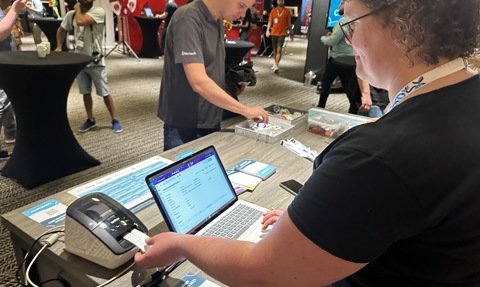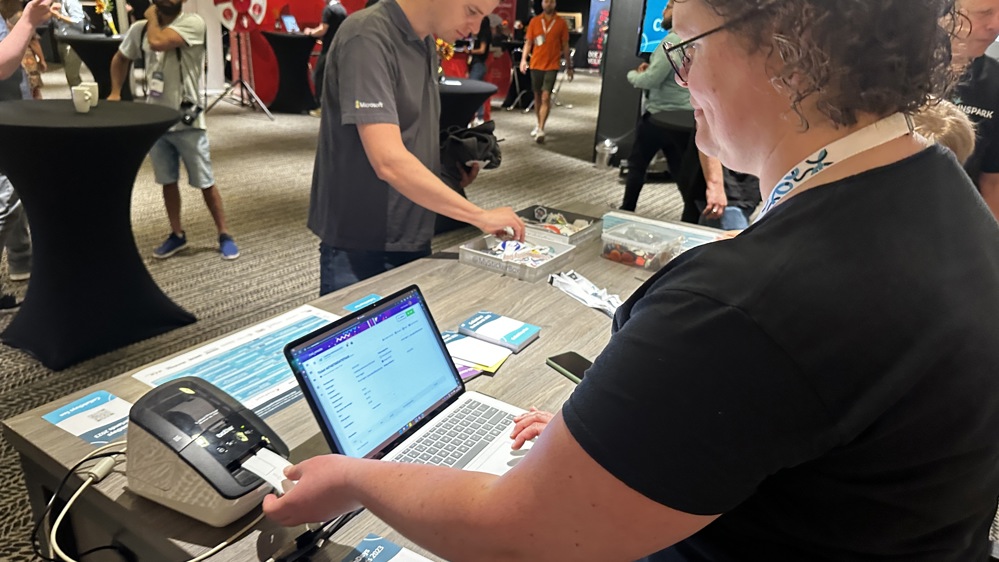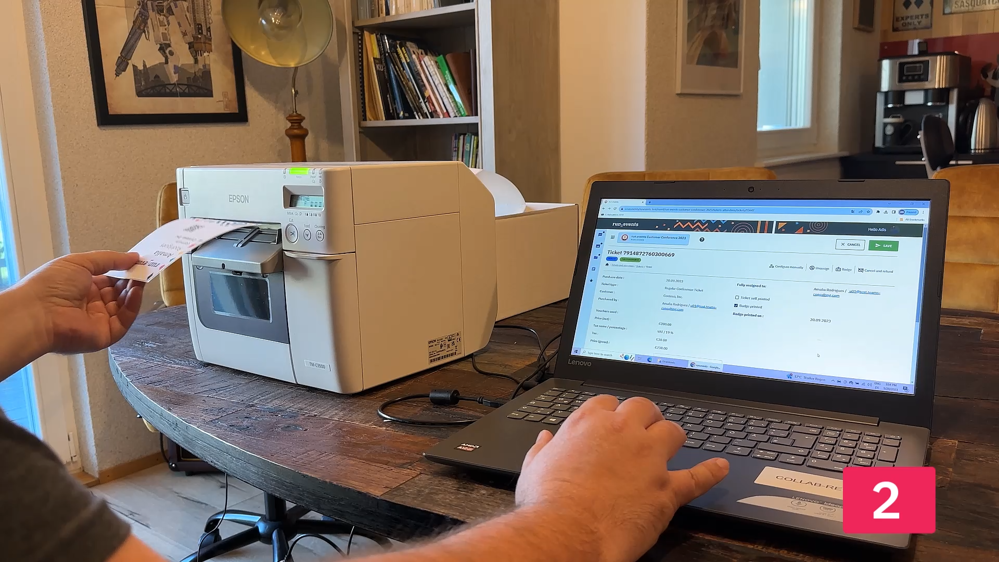What choices do you have for designing and printing event badges


This article is a part of series on Printing Event Badges with run.events:
When it comes to printing event badges, you might find yourself at a crossroads. Should you preprint badges for distribution during registration, or should you opt for on-site check-in and badge printing? Are you wondering whether your staff should handle badge printing at the registration desk or if self-service kiosks are the way to go? Managing badge replacements and handling lost badges can also be a challenge. Plus, it's crucial to ensure that your event management software can seamlessly support your scenarios. Otherwise, you might risk data chaos from multiple exports and imports across different systems.
In this blog post, we'll address these common scenarios, issues, and questions, providing you with valuable answers and insights. Additionally, we'll explore how run.events can assist you in finding effective solutions for your event badge and event technology needs.

Efficient printing of event badges is crucial for streamlined registration processes. The fastest way to manage this is by distributing pre-printed badges. With proper preparation and sorting, it takes just 10-20 seconds per attendee. Any alternative approach will invariably add 10-20 seconds to the registration time. Even if you allocate only 10 seconds for each badge's printing, an event with 2500 attendees can result in an additional 7 hours of registration time. While this time can be spread over multiple days and queues, it won't make the queues move any faster. However, pre-printing badges has its drawbacks. Late registrations and unprinted badges are common issues. Sorting pre-printed badges into manageable queue sizes can be challenging, as printers may mix them up despite your instructions. Plus, there's a concern about data security. Sending badge designs and personal data via Excel files to the print shop can raise GDPR concerns.
An ideal solution is to pre-print the majority of badges with your print shop. Late registrants' badges can be printed on-site at a dedicated desk in the registration hall. To enhance data security, avoid sending Excel files. Instead, create a PDF file with all badges ready to print. This approach minimizes errors and safeguards your attendees' personal information, ensuring a smoother event management software experience.
run.events can fully integrate with Adobe’s and Affinity’s graphic software suites. You can design your badges using professional tools and generate all your badges using data pulled from run.events, ensuring minimum risk.

When it comes to printing event badges, the options are plentiful, but remember that cost doesn't always equate to quality. Your initial decision involves choosing between printing the entire badge in one go or using empty badge templates with attendee data printed on stickers later. Opting to print the complete badge at once can involve a significant investment, ranging from $2,000 for entry-level models to over $10,000 for professional machines. Price variations are due to differences in printing technologies, supported badge sizes (some consider even standard A6 size as 'oversized'), and the complexity of operation (you might even need specialized staff to operate them). One of the most popular professional printers for printing event badges is Epson CW 3500, which is fully supported by run.events.

On the flip side, more economical thermal printers like Brother, Zebra, or Dymo offer a different approach. Models from all three manufacturers are fully supported by run.events. They print stickers that adhere to pre-printed badge templates swiftly, usually in just 1-2 seconds. These sticker rolls are cost-effective, eliminating concerns about replacing inkjet or laser printer cartridges during check-in. However, there are some drawbacks to the thermal printer approach. You'll need to leave enough white space on the badge templates for the stickers. Applying these stickers can be a bit time-consuming, taking about 3 seconds per side, especially if you prefer double-sided badges. Nevertheless, the quality of modern thermal printers and stickers has improved significantly, making the sticker nearly indiscernible unless you scrutinize it closely.
For efficient event badge printing solutions that suit your needs and budget, consider these options carefully. Integrating the right event technology and event management software can further enhance your badge printing experience.
When you make the decision to handle printing event badges independently, whether you're inclined towards pre-printing or on-site printing, and whether you're considering high-end badge printing devices or cost-effective thermal printers, your event management software must empower you to design and print badges seamlessly, eliminating the need for data exporting. Ideally, your software should maintain a precise record of the badges already printed to prevent duplications during batch printing. Avoiding data exports is key to ensuring that you maintain a clear overview of printed and pending badges, sparing you from the risk of confusion regarding who has received their badge and who hasn't.
run.events features an integrated badge designer compatible with all standard printer models, allowing you to print event badges directly without any need for data exports or additional software. The only requirement is a connection between your printer and your computer or tablet.

We've all seen it: Instead of (or, in addition to!) the long registration queues, attendees approach self-check-in kiosks, scan their QR code, and presto: their badge is ready. While this looks neat, be aware that these self-check-in kiosks are often very expensive, often requiring not just the rental of the kiosks but also personnel to operate and maintain them. Moreover, these systems typically don't interface with your own, necessitating the export of your attendee data and importing it into someone else's device, which potentially also raises GDPR issues.
The run.events Check-In Kiosk has revolutionized the self-check-in process. All you need for a self-check-in kiosk is an iPad or an Android tablet and a Bluetooth or Wi-Fi-enabled printer. The run.events self-check-in app will scan the QR code from the attendee's ticket and print a badge. By choosing a thermal printer as your printing option, the costs for such a self-check-in kiosk can be reduced to $600 per station. And that's owning, not renting.
When you decide to go with rented hardware for printing event badges, it often entails a data export and import procedure. Unfortunately, this process can lead to inaccuracies in your check-in data, making it challenging to keep track of who has checked in at your event and when. In the best-case scenario, you'll receive raw data from the badge printing machine, typically in CSV format, which you'll then need to integrate with your existing data. It can be quite a cumbersome process.
This isn't the case with run.events: as attendee registration, badge printing, and attendee check-in processes are fully integrated within the run.events system, you maintain accurate data on all printed badges and checked-in attendees.
We've all encountered the scenario where an attendee approaches the registration desk requesting a replacement badge. Yet, it's not always clear whether they genuinely lost their badge or have other intentions. What happens when a 'lost badge' is scanned during room entry? Managing such situations can be quite challenging, especially when using rented badge-printing devices that often lack this crucial contextual information due to their disconnected data imports from the rest of your system. Exploring integrated solutions for printing event badges and adopting advanced event technology can help streamline these challenges, ensuring a smoother event management experience.
run.events allows you to issue and print replacement badges and choose whether to invalidate previous badges. As an integrated system, it simplifies the tracking of all such cases while at the same time preventing fraud and enabling the system to respond accordingly.